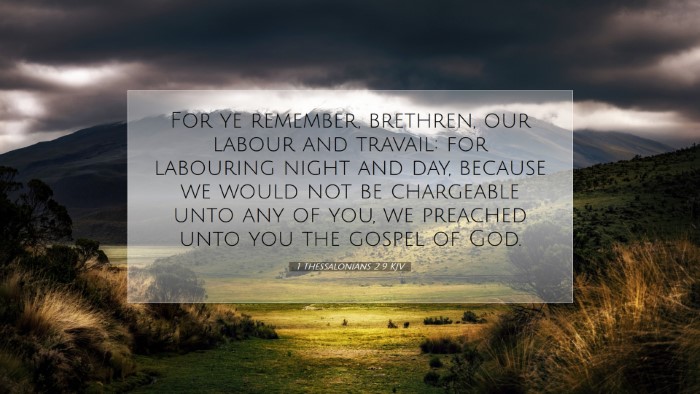Commentary on 1 Thessalonians 2:9
1 Thessalonians 2:9 states:
“For ye remember, brethren, our labour and travail: for labouring night and day, because we would not be chargeable unto any of you, we preached unto you the gospel of God.”
Introduction
This verse reflects the Apostle Paul's heartfelt commitment to the Thessalonian church. It emphasizes the diligence and sacrifices he made in spreading the Gospel, illustrating the profound sense of responsibility and dedication that characterized his ministry.
Historical Context
The Thessalonian church was established during Paul's second missionary journey. Paul, along with his companions Silas and Timothy, faced significant opposition and persecution. However, despite the challenges, they persevered in their ministry, demonstrating integrity and pastoral care.
Analysis of Key Elements
Labour and Travail
Paul uses strong terms like “labour” and “travail,” indicating strenuous effort and hardship. Matthew Henry notes that this reflects both physical and spiritual exertion, suggesting that true ministry requires both effort and endurance.
Night and Day
Paul's commitment was not limited to a 9-to-5 schedule. He laboured "night and day," as Albert Barnes emphasizes, which signifies constant dedication. This alludes to the holistic approach Paul took in his ministry, where work extended beyond preaching to encompass teaching and personal investment in the lives of the Thessalonians.
Chargeable
Paul intentionally refrained from being a financial burden to the church, demonstrating a selfless approach to his ministry. Adam Clarke points out that this principle of not being “chargeable” signals a vital aspect of his character and ministry, promoting a model that values goodwill over financial compensation.
Theological Implications
Self-Sacrifice in Ministry
Paul’s example challenges modern ministers and church leaders to consider their commitments to their congregations. He models the concept of servant leadership, reminding us that true ministry often involves sacrifice and humility.
Gospel Proclamation
The primary focus of Paul’s effort was the proclamation of the Gospel. This emphasizes that the driving force behind his labour was a desire to see others come to faith in Christ. Henry notes that the Gospel is central to the Christian life, and Paul devoted himself to its dissemination with great passion.
Practical Applications
The following applications can derive from Paul’s example in 1 Thessalonians 2:9:
- Commitment to Service: Modern pastors should reflect on their own service levels, considering how they can emulate Paul’s dedication.
- Financial Integrity: There should be a commitment to financial transparency and accountability in ministry, ensuring that the focus remains on spiritual rather than material gain.
- Balance of Work and Preaching: Ministers may find it beneficial to balance professional work with pastoral duties, as Paul did, to avoid undue reliance on the congregation.
Conclusion
In 1 Thessalonians 2:9, we find a profound illustration of the heart of a true minister. The labor, dedication, and self-sacrificial nature of Paul’s ministry provide enduring lessons for all believers. As pastors and church leaders reflect on these themes, they are encouraged to pursue their calling with the same fervor and integrity that characterized Paul’s work in Thessalonica.


